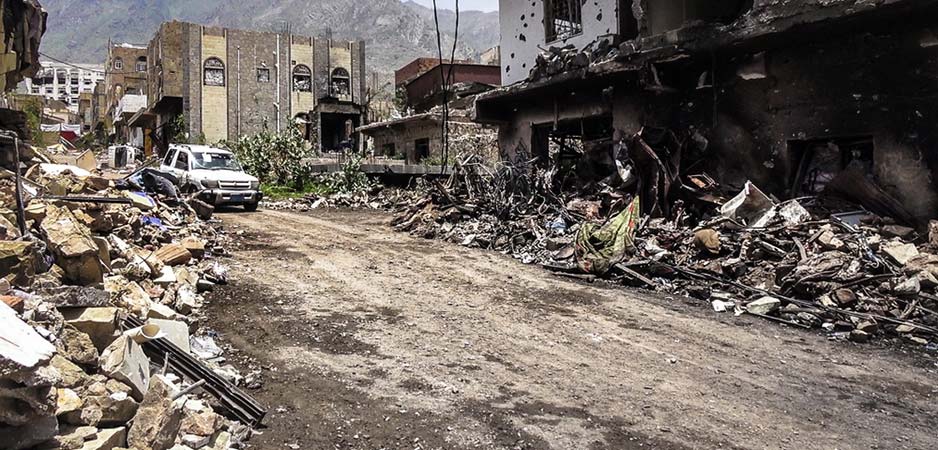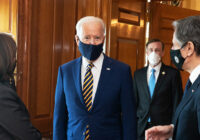On April 9, the government of Saudi Arabia unilaterally called for a two-week ceasefire in the five-year conflict that has ravaged Yemen, the Middle East’s poorest nation. The UN, the European Union and the US Congress have long called for a suspension of hostilities and a return to the negotiating table. In June 2019, Congress voted to suspend all weapons sales to the kingdom for its efforts to subdue the Iran-backed Houthi rebels in Yemen. The Houthis now control the capital city of Sanaa and much of the northern portion of the country. US President Donald Trump vetoed the bill.
Talking About the Other Side of Yemen
Until now, the Saudis have steadfastly rejected calls to end involvement in the war. So, why the ceasefire proposal now? It comes down to cost, the collapse of oil prices, Congress and the coronavirus pandemic. The confluence of continuing high costs of its involvement — variously estimated at $5 to $7 billion a month — and tanking oil prices mean the kingdom cannot sustain its war in Yemen and still meet its many domestic budget needs. Saudi Arabia’s declining foreign exchange reserves underscore the need for emergency first aid to stanch the kingdom’s financial hemorrhaging in Yemen.
Furthermore, the kingdom’s de facto ruler, Crown Prince Mohammed bin Salman is badly in need of an image makeover in the US, most especially in Congress. The sooner he can extricate his nation from the ugly war to its south, the sooner he can begin his long trek back to respectability in the US and begin rebuilding bipartisan support again for the US-Saudi Arabia relationship. This will be especially important if his primary patron in Washington today, President Trump, fails in his reelection bid this coming November.
The real hope for a genuine ceasefire, however, may be the horrifying prospect of the deadly coronavirus appearing in Yemen. Both the kingdom and neighboring Oman have already been affected by the virus. Yemen saw its first case on April 10. The country has practically no capacity to deal with an outbreak. Its hospital system is already stretched well beyond its breaking point from the ravages of the war and a population reeling from acute food insecurity, lack of potable water, cholera and abysmal standards of hygiene. Its infrastructure, the Middle East’s least developed before the war, has been diminished by 50%. In Yemen, the coronavirus would spread faster than a wildfire through a parched prairie. The nation would be totally dependent on foreign assistance from nations themselves struggling to cope with the virus at home.
Such an outbreak in Yemen would likely precipitate mass migration into Saudi Arabia, exacerbating its own coronavirus problem. Neighboring countries, including Oman, the United Arab Emirates, Somalia and Egypt might also see an influx of coronavirus refugees.
When a Pandemic May Not Be Enough
That Saudi Arabia may be more motivated than ever to bring a halt to the war is evident. However, is a ceasefire declaration sufficient?
Bringing this tragic conflict to an end will need the involvement and agreement of multiple parties and compromises from them not previously contemplated. The Houthi rebels may now believe they have their Saudi adversaries on their backfoot and may choose to press for concessions in the future governance of Yemen that the Saudis have hitherto rejected. They have evolved from a ragtag rebel movement to a governing — though terribly ineffectively — organization that has successfully stood up to one of the region’s major powers. What will they want?
Despite the Houthis’ hard-fought gains, the country’s majority Sunnis must also be appeased. Can they accept a major Houthi role in a new government? If not, could they continue their war against the Houthis without direct Saudi military support?
For Yemen’s Houthis and Sunnis, the cloud of the coronavirus hangs ominously over them both. Continuing to pursue a conflict amidst a pandemic rampaging through the civilian population and fighters alike is equally untenable. Regardless of how committed to their respective political causes, they cannot ignore a disease that recognizes no combatant, political agenda, party or interest.
Myriad other questions hang over the conflict. This isn’t truly a civil war. Powers outside the isolated nation on the Arabian Peninsula, especially Saudi Arabia and Iran but also the UAE, will have much to say. Moreover, if Yemen is ever to recover, it will need to rebuild with foreign assistance from the US, the EU and perhaps even China. The Yemenis will need a seat at the table as well.
There is also the political virus that has plagued Yemen for more than a decade and a half: al-Qaeda in the Arabian Peninsula (AQAP), known as Ansar al-Sharia in Yemen. How are the parties to address that persistent nemesis? And while AQAP can ill afford to turn its back on the coronavirus, the martyr-driven ideology of al-Qaeda presents special challenges to ultimate peace in this bloodied corner of the peninsula.
Doctor in the House?
If an initiative to halt the fighting and begin a genuine effort to resolve the disputes propelling it is to succeed, however, it will need major power momentum behind it. That is where the US could play a constructive role. The US has considerable leverage over Saudi Arabia and the UAE, influence with governments whose participation in rebuilding Yemen is vital and some incentive capability with Iran. Heretofore under Trump, the US has been little inclined to involve itself in peacemaking in Yemen, short of anodyne platitudes from the State Department and counterproductive support for Saudi Arabia’s war-making. Now would be a good time to appoint a special envoy to lend the force of the US to a true peacemaking effort, including quiet overtures to Iran and engagement with the Houthis. That is, America needs to flex its atrophied diplomatic muscles to conduct some tough diplomacy to help end a conflict that has yielded no winners, only millions of victims.
The coronavirus that haunts the planet today can ironically advance the hope for ending a horrifying conflict. A basic principle of war is to avoid battling enemies on separate fronts. Pursuing this particular and already proven futile war and simultaneously fending off the coronavirus is a fool’s errand. That enemy is impervious to any weapon now at the disposal of the contending parties. It is relentless and will rip through the most powerful armed force irrespective of troop numbers, weapons, political or religious ideology or revolutionary fervor. Ending the war, tending to the needs of Yemen’s people and defeating the viral enemy must be the objective now.
The views expressed in this article are the author’s own and do not necessarily reflect Fair Observer’s editorial policy.
Support Fair Observer
We rely on your support for our independence, diversity and quality.
For more than 10 years, Fair Observer has been free, fair and independent. No billionaire owns us, no advertisers control us. We are a reader-supported nonprofit. Unlike many other publications, we keep our content free for readers regardless of where they live or whether they can afford to pay. We have no paywalls and no ads.
In the post-truth era of fake news, echo chambers and filter bubbles, we publish a plurality of perspectives from around the world. Anyone can publish with us, but everyone goes through a rigorous editorial process. So, you get fact-checked, well-reasoned content instead of noise.
We publish 2,500+ voices from 90+ countries. We also conduct education and training programs
on subjects ranging from digital media and journalism to writing and critical thinking. This
doesn’t come cheap. Servers, editors, trainers and web developers cost
money.
Please consider supporting us on a regular basis as a recurring donor or a
sustaining member.
Will you support FO’s journalism?
We rely on your support for our independence, diversity and quality.






